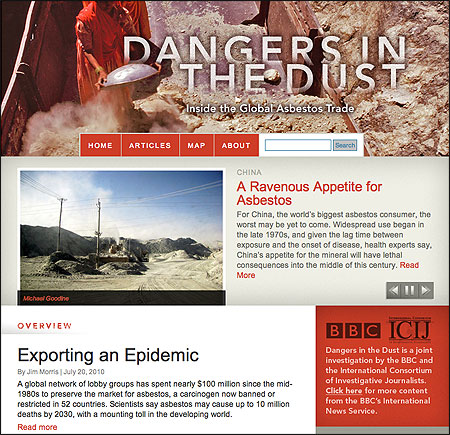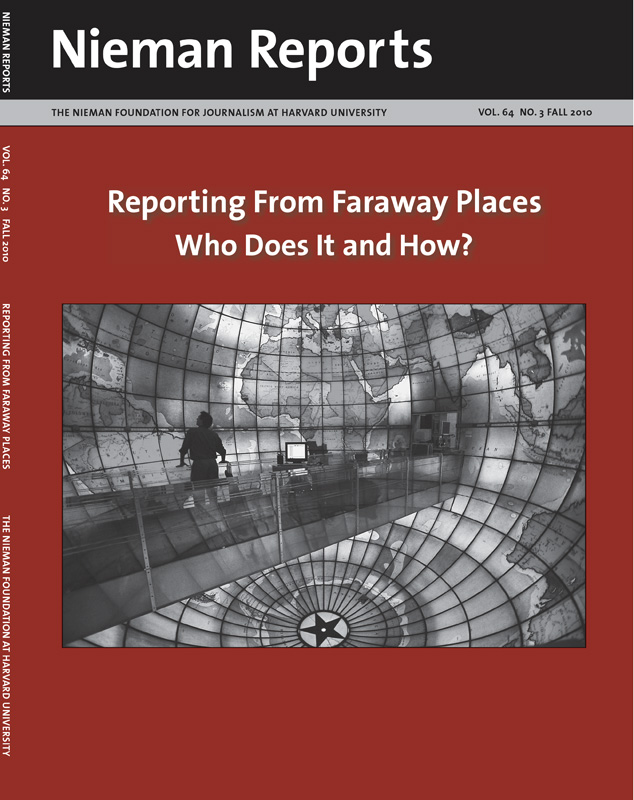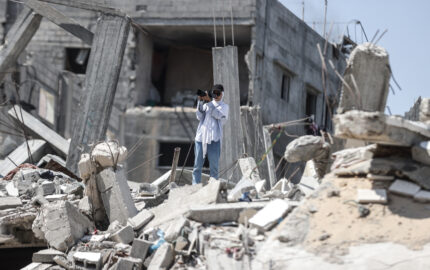
The homepage for the International Consortium of Investigative Journalists’ asbestos project.
Doing quality investigative reporting has always been a challenge, even in the United States, where the craft enjoys an honored and storied century-long tradition. We’ve had to fight for reporting time and for space to publish and broadcast what we’ve dug up. We face threats from lawsuits and from penny-pinching owners. Lately the obstacles have become downright nasty: a shifting economic model for news, changing technology, fleeting attention spans, and a bruising recession.
And we have it easy.
Now add to those challenges a whole new set from operating internationally: differences in language, culture, professional standards, and libel laws. Then throw in a bunch of more mundane headaches like time differences and access to reliable communications. Finally, figure out a way to finance a months-long multinational bout of muckraking.
Welcome to my world—or, more precisely, welcome to the International Consortium of Investigative Journalists (ICIJ), a rather unusual animal in the news media wilderness. We are a network of leading investigative reporters, with more than 100 members in 50 countries. Our journalists—numbering anywhere from three to 20—come together as teams to work on long-term investigative projects. We’re a true network, linked by cell phones, e-mail, collaborative online software, and a handful of core staff in Washington, D.C.
ICIJ was created in 1997 by the Center for Public Integrity, one of the original nonprofit centers dedicated to investigative journalism. Founded 20 years ago in Washington, D.C., the center was the brainchild of former “60 Minutes” producer Chuck Lewis. He recognized the need for an independent organization in the nation’s capital to do the kind of tough investigations into corruption, conflict of interest, and other pressing social issues that the news media too often fail to cover.
ICIJ was charged with taking the center’s style of in-depth, watchdog journalism overseas. While our name might be unfamiliar, our work might not be. Over the years ICIJ teams have exposed the collusion of tobacco companies with organized crime; investigated the hidden efforts of private military cartels, water privatization developers, and climate change lobbyists; and broken new ground by revealing details of Iraq and Afghanistan war contracts, including those of a once obscure company called Halliburton.
I came on board as ICIJ director in 2008, following in the footsteps of Maud Beelman, who is now deputy managing editor for projects and enterprise at The Dallas Morning News. Building on the foundation that she and others established, we have expanded ICIJ and now have a staff of six at our Washington headquarters, a growing membership, and an active Facebook community of more than 5,000 followers in at least 30 countries. Our partners include some of the world’s top media organizations: the BBC’s International News Services; Le Soir, the leading French daily in Brussels; Folha de Sao Paulo, Brazil’s top paper; Novaya Gazeta, one of the few gutsy papers left in Russia; and the enterprising McClatchy newspaper chain here in the United States.
Global Collaboration
Our latest series, on how the asbestos industry has targeted developing countries, featured 21 stories produced by a joint BBC/ICIJ investigation that appeared on radio and TV and in newspapers, weekly magazines, and as online multimedia presentations. Dubbed “Dangers in the Dust: Inside the Global Asbestos Trade,” the series began modestly enough with a proposal by veteran environmental reporter Jim Morris to do a single feature on the asbestos trade. Morris had been asking sources, “What’s the biggest public health story no one’s writing about?” Some suggested he look at the booming asbestos trade in the developing world and pointed him toward Fernanda Giannasi, a Brazilian labor inspector waging what amounted to a one-woman war against the asbestos industry. Marina Walker Guevara, ICIJ’s deputy director, grew convinced that he was on to a good story. On the lookout for shorter pieces to accompany our big projects, we commissioned the piece and sent him to Brazil.
That was in the fall of 2009. Like many investigative stories, I expected we’d continually narrow our focus on this piece until what remained were the bare essentials. That didn’t happen. The more we learned, the more intrigued we became. It turned out that 52 countries had either banned or sharply restricted the use of asbestos, blamed for killing hundreds of thousands of workers in North America and Europe. The European Union has banned entirely the sale of the mineral. Yet sales of the fiber, valued for its fire and heat resistance, are booming in China, India and other developing countries. One key reason we found: The asbestos industry has spent millions of dollars to market its wares around the world. The human cost, health experts told us, would be enormous: By the year 2030, some predicted, between 5 million to 10 million people would die from asbestos-related cancer, with the toll increasingly centered in the developing world.
Convinced we had a great story, we began assembling a team. One of ICIJ’s strengths is its ability to draw on top local reporters in a host of countries. Membership in ICIJ is by invitation only, and we work with first-rate journalists wherever we find them—at partner news organizations and nonprofit investigative centers and among the embattled foreign press corps of freelancers and fixers around the world. With “Dangers in the Dust,” our outreach effort was no different. By now, Morris had joined the Center for Public Integrity staff and become our project leader. In New Delhi, India, we recruited Murali Krishnan, a veteran correspondent and longtime ICIJ member. From Russia, we worked with Roman Shleynov, the investigative editor of Novaya Gazeta. In Mexico, we tapped the talented Ana Avila, a freelance reporter based in Mexico City. And in London we teamed up with Steve Bradshaw, an accomplished BBC producer.
Key to ICIJ projects is finding the right partners. Linking up with major news organizations boosts both our resources and our reach. In this case we approached Anne Koch, the commissioning editor of the BBC World Service. She grasped immediately the potential of the story and opened door after door at the BBC. We soon were working with World Service, the BBC’s overseas radio branch which reaches into more than 150 countries; BBC World TV, the international news channel seen around the globe; and BBC News Online, one of the world’s top news sites. Backed by ICIJ reporting and its own work, the BBC staff produced 10 news and documentary programs on asbestos while ICIJ published its own seven-part series which we syndicated to our print partners around the world.
Collaborations this big can turn maddeningly complex. The final project grew into a nine-month, eight-country behemoth. We translated Gujarati-language legal complaints from state labor officials in India, pored through Portuguese-language company records in Brazil, and pursued reluctant industry officials in a half-dozen countries. A dozen reporters and producers each from ICIJ and the BBC worked on the project, some in tandem, some independently. We had to sort out questions of assignments, key findings, legal review, and joint credit. There were, not surprisingly, differences in organizational culture. The stately, measured BBC and ICIJ’s scrappy network of investigators sometimes saw the stories differently, but both sides benefited immensely from a respectful dialogue and careful approach. As in all partnerships, success depended on personal relationships, and we owe much to Koch’s leadership at the BBC.
The topic itself was complicated, with no shortage of angles. There was a strong science story, in which industry-backed scientists argued that white asbestos—the only kind used today—is less hazardous than now-banned blue or brown forms. It was also a business story, with our reporters scoping out the dimensions of a multibillion dollar industry ranging from a Russian mine half the size of Manhattan to Indian mom-and-pop shops that sell asbestos-laden roof sheeting. Most of all, for ICIJ, it was a follow-the-money investigation. After months of digging, our team pieced together the story of how the asbestos industry had spent nearly $100 million since the mid-1980’s to keep its toxic product in commerce.
The series, released July 21, has reached millions worldwide and sparked needed debate in Brazil, India, and Mexico, as well as in Canada, where the leader of the Canadian opposition has called for an end to his country’s role as a major asbestos exporter. Still, these big international projects are like wrestling an alligator—exhausting. At the end of what became a grueling editorial process, I turned to the center’s managing editor, my old friend Gordon Witkin, and asked him to remind me, “Why do we like doing this?”
His answer—and mine—was obvious: This kind of a job is more than work—it’s a calling, and we’re a few of the lucky ones left who get to do it.
David E. Kaplan directs the International Consortium of Investigative Journalists, a global reporting initiative based at the Center for Public Integrity in Washington, D.C.



